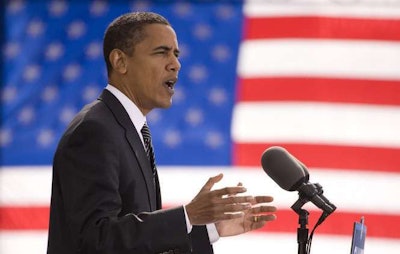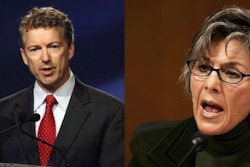
Instead of raising the federal gas tax, Obama’s proposal would be paid for with money generated by a one-time tax holiday for companies with overseas investments. The idea has received bipartisan support and was first proposed by Senators Rand Paul (R-Ky.) and Barbara Boxer (D-Calif.).
The plan calls for a process called “repatriation,” according to a report from The Hill, and would tax companies at a rate of 14 percent for any earnings brought back into the United States. The tax would raise an estimated $238 billion that would be designated for the Highway Trust Fund.
“This transition tax would mean that companies have to pay U.S. tax right now on the $2 trillion they already have overseas, rather than being able to delay paying any U.S. tax indefinitely,” a White House official said in a statement.
Obama’s proposal would spend approximately $317 billion on the country’s roads and bridges over the next six years, including $94.7 billion during the 2016 fiscal year. The plan also includes $143 billion for federal transit projects and $18 billion for freight improvements over six-year period.
“The budget proposes to invest in infrastructure through a comprehensive six-year surface transportation reauthorization proposal, as well as tax incentives for State and local infrastructure investment, a new Infrastructure Bank, and other initiatives,” the White House said in a statement. “The federal government plays a vital role in infrastructure investment, and the nation’s roads, bridges, and other surface transportation infrastructure systems are badly in need of upgrades and repairs.”
Without some sort of deal, the current Highway Trust Fund will run out of money in May.
After Obama’s proposal went public, American Road and Transportation Builders Association (ARTBA) President and CEO Pete Ruane released the following statement:
“The President’s budget recognizes the obvious. Status quo federal investment levels in America’s highways, bridges, and transit systems just won’t cut it anymore and isn’t a formula for strong economic growth.
“Passage of a robust, six-year transportation investment proposal as envisioned by the President would send the right signal to states planning new projects and to private sector companies contemplating whether to hire workers and make capital investment decisions.
“However, we shouldn’t put the horse before the cart. The most immediate challenge facing Congress and the President is reaching agreement on a sustainable revenue source to fix the beleaguered Highway Trust Fund before the next extension expires at the end of May. We urge them to check political expediency at the door and work together to quickly find a permanent funding solution for the nation’s transportation networks.”
President and CEO of the National Stone, Sand, and Gravel Association (NSSGA) Michael W. Johnson praised Obama’s plan in a statement sent to the public.
“The aggregates industry welcomes the president’s proposal because it focuses much needed revenue to rebuild our nation’s crumbling infrastructure,” Johnson said. “While this approach avoids some of the political difficulties that many other measures face, it will be an uphill struggle to get it through Congress.”
The plan is not without its critics. Chairman of the Senate Finance Committee, Sen. Orrin Hatch (R-Utah) has had issues with the idea of a tax holiday ever since Paul and Boxer proposed the idea.
“Tax holiday proposals designed to pay for the transportation bill sound great until you look at the details,” Hatch said in a statement.
“After all, the Joint Committee on Taxation (JCT) has clearly detailed how a stand-alone temporary tax holiday would end up costing the government in the end,” he continued. “Saying you’re going to use something that loses money to pay for anything is just wrong. Therefore, saying you’re going to use it to pay for infrastructure is just bad policy, plain and simple. Such proposals to end the lock-out effects of earnings should only be considered in the context of tax reform.”
Meanwhile, American Association of State Highway and Transportation Officials released a statement applauding Obama making a long-term transportation funding bill one of his top priorities.
“We applaud the President and his administration for their leadership that has set the stage for a serious discussion about the next surface transportation bill,” said Bud Wright, AASHTO executive director. “We know the hardest conversations will involve how to fund infrastructure investments. We look forward to working with the President and Congress on developing a new transportation bill supported by a long-term, sustainable source of funding.”











